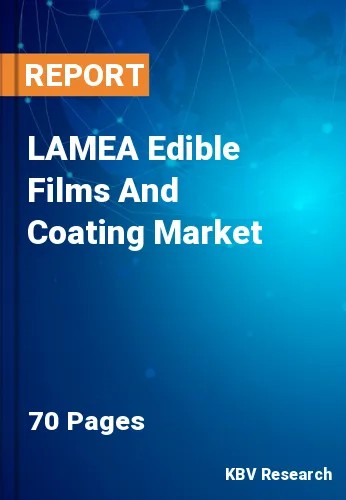
The Latin America, Middle East and Africa Edible Films And Coating Market would witness market growth of 10.6% CAGR during the forecast period (2022-2028).
Functional elements such as antioxidants, antimicrobials, nutrients, and tastes can be added to edible films and coatings to improve food stability, quality, functionality, and safety. In recent years, the idea of utilizing edible films or coatings to extend the shelf life of foods while also protecting them from hazardous environmental effects has gained popularity. Increased environmental awareness, the need for higher-quality foods, the demand for novel food processing and storage methods, and the scientific discovery of new materials' utility have reignited interest in edible films and coatings among researchers and industry.
Fresh fruits and vegetables with edible coatings have a longer shelf life after harvest. Because of its environmentally benign nature, it is utilized to enhance food presentation as well as maintain food safety. Protein, lipid, polysaccharide, or resin may be used alone or in combination as an edible covering. It works as a moisture and gas barrier during manufacturing, transport, and storage. Its activity or the addition of an antimicrobial ingredient minimizes food degradation and improves safety.
The United Arab Emirates (UAE) is a wealthy country with an excellent infrastructure for importing, exporting, and transiting goods to and from the region and the rest of the world. Because it is a member of both the Pan-Arab Free Trade Area and the Gulf Cooperation Council (GCC), a political and regulatory union amongst countries in the Arabian Gulf, the UAE has low tariffs throughout the Middle East.
As part of the UAE's new Food Security policy, food and beverage investments are currently valued at $16.8 billion and are predicted to grow progressively. In 2019, the UAE had 568 food and beverage manufacturers, the majority of which were small and medium-sized. Every year, these firms produced 5.96 million metric tons (MT) of food and beverage products, with 2.3 MT of vital foods. The sector, which is heavily reliant on imported goods and ingredients, is critical to the government's efforts to improve food security and self-sufficiency. Wholesale and intermediary agricultural product imports totaled $4 billion in 2020, accounting for 5% ($211 million) of total imports.
The Brazil market dominated the LAMEA Edible Films And Coating Market by Country in 2021, and would continue to be a dominant market till 2028; thereby, achieving a market value of $81.9 million by 2028. The Argentina market is experiencing a CAGR of 11.2% during (2022 - 2028). Additionally, The UAE market would exhibit a CAGR of 10.3% during (2022 - 2028).
Based on Application, the market is segmented into Fruits & Vegetables, Bakery & Confectionery, Dairy Products, Meat, Poultry, & Seafood, and Nutritional Products. Based on Material, the market is segmented into Polysaccharides, Protein, Lipids, and Composites. Based on countries, the market is segmented into Brazil, Argentina, UAE, Saudi Arabia, South Africa, Nigeria, and Rest of LAMEA.
Free Valuable Insights: The Global Edible Films And Coating Market is Predict to reach $4.2 Billion by 2028, at a CAGR of 7.5%
The market research report covers the analysis of key stake holders of the market. Key companies profiled in the report include Tate & Lyle PLC, Ingredion, Incorporated, DuPont de Nemours, Inc., Koninklijke DSM N.V., Kerry Group PLC, Döhler Gmbh, Cargill Corporation, Glanbia PLC (Watson Inc.), Lactips , and Pace International, LLC (Valent BioSciences LLC.)
By Application
By Material
By Country
Our team of dedicated experts can provide you with attractive expansion opportunities for your business.
